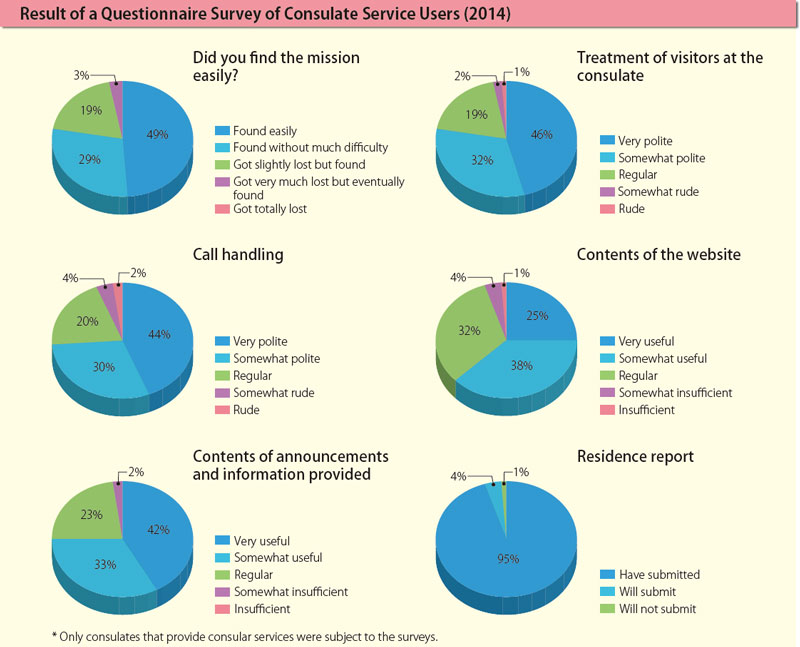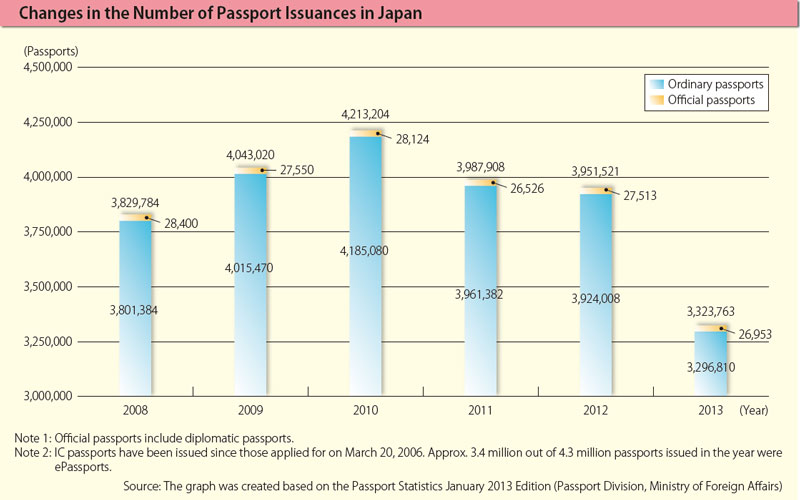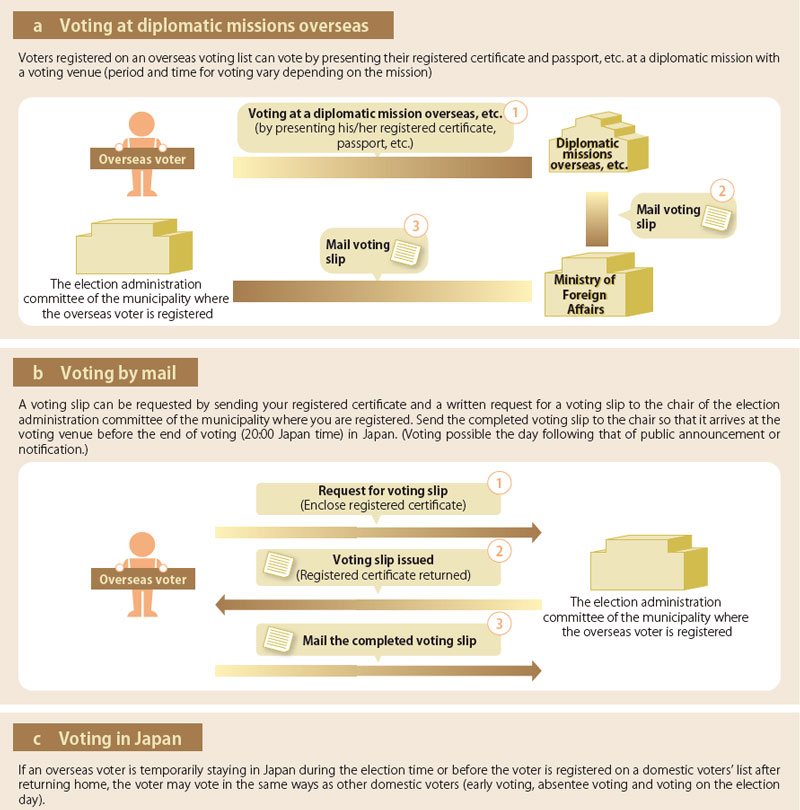Diplomatic Bluebook 2015
Chapter 4
Japan’s Diplomacy Open to the Public
2.Consular Service and Assistance for Living Overseas
(1) Improving Consular Service
MOFA conducts a questionnaire survey every year on consular services and over-the-counter services provided by diplomatic missions overseas to reflect the voices of Japanese nationals residing overseas in improvement and enhancement of consular services.
In 2014, the surveys were conducted by 150 diplomatic missions overseas and received about 20,000 responses. The result shows generally high satisfaction with regard to over-the-counter services; however, a small number of respondents expressed unfavorable opinions. Also, some responded that the “Visiting Consular Service” provided as part of consular services was not necessarily convenient for users. MOFA intends to continue its efforts for improvements while listening to the voices of the users so as to provide consular services in line with the needs of users.
(2) Issuance of Passports and Prevention of Illicit Acquisition of Passports
Approximately 3.21 million passports were issued in Japan in 2014. As of the end of December 2014, the number of ePassports3 is about 29.03 million, accounting for about 94% of all the valid Japanese passports.
The issuance of ePassports is effective for deterring the illicit use of passports, such as forged or altered passports; however, cases of illicit acquisition of passports by means of impersonation4 still continue occurring. There were cases where Japanese nationals or illegal foreign residents left and entered Japan using passports bearing the name of another person which had been acquired illegally. Also, passports with false identities were used for borrowing money from financial institutions, for opening bank accounts for the purpose of selling them to those who plot to commit other crimes, and for subscribing to mobile phone services without the real passport holders knowing. In order to prevent illicit acquisition of passports that may nurture these secondary or tertiary crimes, MOFA is further making efforts to enhance strict identity examination when issuing a passport, for example, by designating a stringent examination period against the illicit acquisition of passports through identity theft at passport offices located in each prefecture.

When there was a change in the name of the passport holder, etc., the previous method was to make amendments in the registered entry. However, the amended passport information may not be regarded as authentic identification in other countries. In light of this situation, MOFA abolished the previous method and started issuing new updated passports since March 20, 2014.
In the meantime, Machine Readable Passports (MRP) are issued in most countries of the world, in accordance with the recommendations of the International Civil Aviation Organization (ICAO). As the penetration of ePassports with improved security progresses, possibilities of more effective use of IC chip functions such as those containing biological information like fingerprints in addition to facial images, is now being considered and discussed at the ICAO and the International Organization for Standardization (ISO).
Consignment of passport-related work from the prefectural governments to city/town offices has been possible since 2006, such as application and delivery, and about 750 cities/towns had started passport service by the end of 2014, which covers about 40% of all the cities/towns in Japan.

- 3 ePassports stores digitized facial image of the passport holder (biological information) on the IC chip. It was first issued in 2006.
- 4 The number of illegal acquisitions of passports discovered: 86 passports in 2010, 43 in 2011, 26 in 2012, 13 in 2013 and 12 in 2014.
(3) Overseas Voting
The overseas voting system allows Japanese voters living overseas to vote in national elections. In the elections after June 2007, it was made possible to vote in the small electoral district election for the House of Representatives and in the electoral district election for the House of Councilors (including by-election and recall election), in addition to voting in the proportional representation segment of elections for the House of Representatives and the House of Councilors. In December 2014, the 47th election for the House of Representatives was conducted. A referendum concerning the constitutional amendment can also be voted in the same manner.
In order to vote overseas, it is necessary to be registered in advance in the overseas voter directory managed by the election board of the city/town government and to obtain overseas voter identification. Voters with valid overseas voter identification can vote by choosing one of the following three methods of voting, diplomatic mission overseas voting, postal voting, or voting in Japan. Japanese diplomatic missions overseas have been making efforts to disseminate the system and to increase the number of registered voters by publicizing this system and carrying out a visiting service for the registration of Japanese nationals living in remote areas.

(4) Assistance for Japanese Nationals Living and Engaging in Activities Overseas
A. Japanese schools and Supplementary Education Schools
Education for children is one of the major concerns for Japanese nationals living abroad. In cooperation with the Ministry of Education, Culture, Sports, Science and Technology, MOFA carries out assistance for Japanese Schools (partial subsidy for school building rental fees, rewards for locally hired teachers and safety measures expenses) so that the overseas school children at the age of domestic compulsory education can receive education equivalent to that of in Japan. MOFA also provides assistance (partial subsidy for school rental fees and rewards for locally hired teachers) for Supplementary Education Schools (educational institutions established to maintain children’s ability, such as Japanese language ability) mainly in areas where Japanese Schools are not located. The number of Japanese children living abroad has been on an increasing trend in recent years, and MOFA and the Ministry of Education, Culture, Sports, Science and Technology intend to continue/enhance its assistance.
B. Medical/health measures
In order to provide health advices through consultations to Japanese nationals residing in countries where the medical situation is generally poor, MOFA dispatches medical teams with the cooperation of domestic medical institutions (13 cities in five countries in FY2014). MOFA also dispatches medical specialists in regions where air pollution is causing grave concern (12 cities in four countries in FY2014). In addition, MOFA has been actively providing medical information, such as information on the spread of infectious diseases overseas, through the Overseas Safety Website and the websites of diplomatic missions overseas.
C. Other needs
In order to eliminate the complexity of various procedures for Japanese nationals living overseas (including converting Japanese driving licenses to one of the country of residence and obtaining residence/work permits) and to make living abroad more comfortable, MOFA continues talks with foreign governments. When converting driving licenses in Japan, persons with driver’s licenses issued in a foreign country can obtain Japanese drivers licenses without taking certain examinations (written examination and skill examination) if it is recognized that they should have no problem operating vehicles.
On the other hand, it is mandatory to take driving tests when converting Japanese licenses to local licenses in some North and South American countries, for example. MOFA is calling for those countries to streamline the procedures for license conversion as in Japan.
MOFA also supports victims of atomic bomb attacks living overseas in applying for the authorization of Atomic Bomb Diseases and for the issuance of Health Check Certificates, via diplomatic missions overseas.
